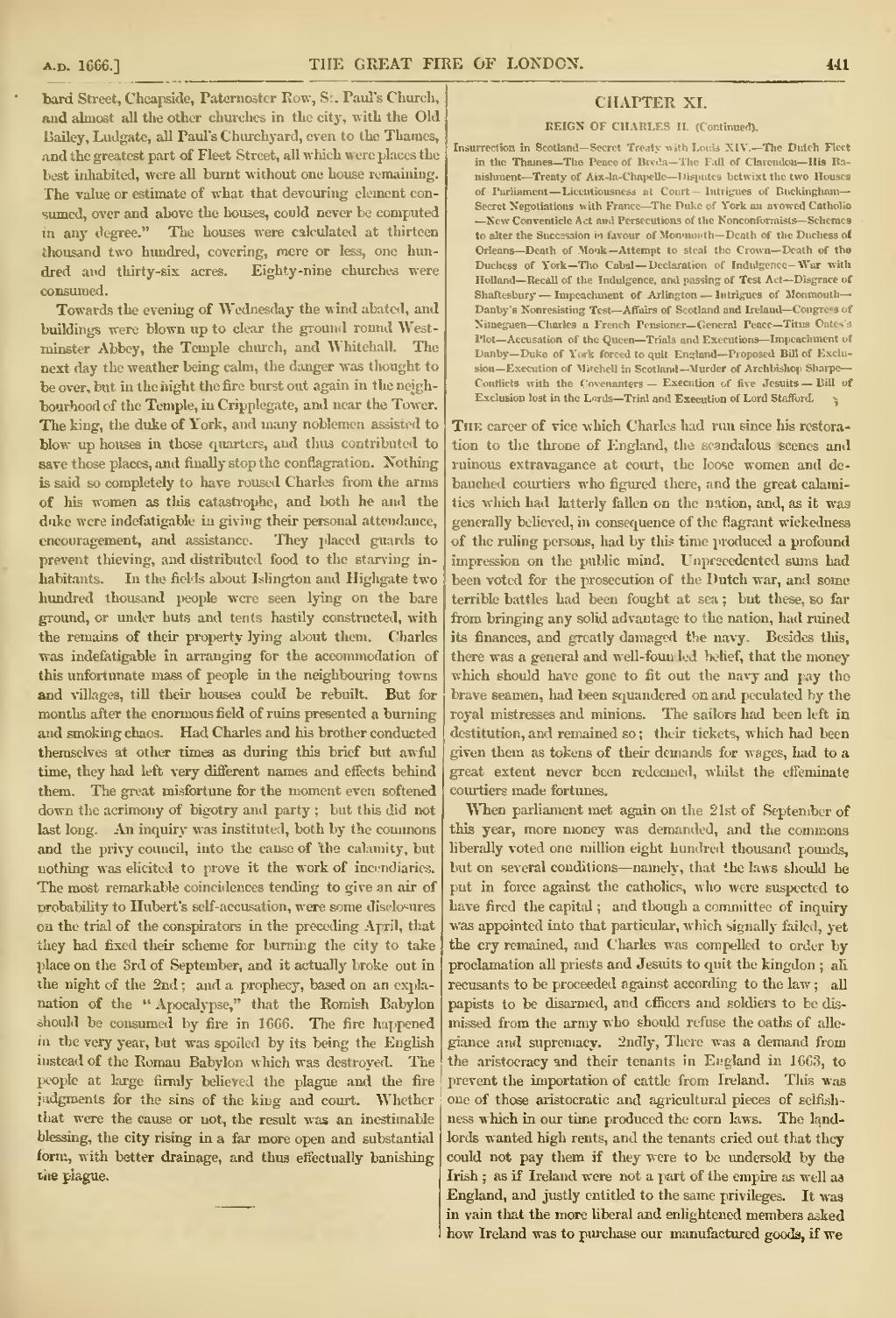bard Street, Cheapside, Paternoster Row, S:. Paul's Church, and almost all the other churches in the city, with the Old Bailey, Ludgate, all Paul's Churchyard, even to the Thames, and the greatest part of Fleet Street, all which were places the best inhabited, were all burnt without one house remaining. The value or estimate of what that devouring element consumed, over and above the houses, could never be computed in any degree." The houses were calculated at thirteen thousand two hundred, covering, more or less, one hundred and thirty-six acres. Eighty-nine churches were consumed.
Towards the evening of Wednesday the wind abated, and buildings were blown up to clear the ground round Westminster Abbey, the Temple church, and Whitehall. The next day the weather being calm, the danger was thought to be over, but in the night the fire burst out again in the neighbourhood of the Temple, in Cripplegate, and near the Tower. The king, the duke of York, and many noblemen assisted to blow up houses in those quarters, and thus contributed to save those places, and finally stop the conflagration. Nothing is said so completely to have roused Charles from the arms of his women as this catastrophe, and both he and the duke were indefatigable in giving their personal attendance, encouragement, and assistance. They placed guards to prevent thieving, and distributed food to the starving inhabitants. In the fields about Islington and Highgate two hundred thousand people were seen lying on the bare ground, or under huts and tents hastily constructed, with the remains of their property lying about them. Charles was indefatigable in arranging for the accommodation of this unfortunate mass of people in the neighbouring towns and villages, till their houses could be rebuilt. But for months after the enormous field of ruins presented a burning and smoking chaos. Had Charles and his brother conducted themselves at other times as during this brief but awful time, they had left very different names and effects behind them. The great misfortune for the moment even softened down the acrimony of bigotry and party; but this did not last long. An inquiry was instituted, both by the commons and the privy council, into the cause of the calamity, but nothing was elicited to prove it the work of incendiaries. The most remarkable coincidences tending to give in air of probability to Hubert's self-accusation, were some disclosures on the trial of the conspirators in the preceding April, that they had fixed their scheme for burning the city to take place on the 3rd of September, and it actually broke out in the night of the 2nd; and a prophecy, based on an explanation of the "Apocalypse," that the Romish Babylon should be consumed by fire in 1666. The fire happened in the very year, but was spoiled by its being the English instead of the Roman Babylon which was destroyed. The people at large firmly believed the plague and the fire judgments for the sins of the king and court. Whether that were the cause or not, the result was an inestimable blessing, the city rising in a far more open and substantial form, with better drainage, and thus effectually banishing the plague.
CHAPTER XI.
REIGN OF CHARLES II. (Continued).
The career of vice which Charles had run since his restoration to the throne of England, the scandalous "scenes and ruinous extravagance at court, the loose women and debauched courtiers who figured there, and the great calamities which had latterly fallen on the nation, and, as it was generally believed, in consequence of the flagrant wickedness of the ruling persons, had by this time produced a profound impression on the public mind. Unprecedented sums had been voted for the prosecution of the Dutch war, and some terrible battles had been fought at sea; but these, be far from bringing any solid advantage to the nation, had ruined its finances, and greatly damaged the navy. Besides this, there was a general and well-fouuled belief, that the money which should have gone to fit out the nay and pay the brave seamen, had been squandered on and peculated by the royal mistresses and minions. The sailors had been left in destitution, and remained so; their tickets, which had been given them as tokens of their demands for wages, had to a great extent never been redeemed, whilst the effeminate courtiers made fortunes.
When parliament met again on the 21st of September of this year, more money was demanded, and the commons liberally voted one million eight hundred thousand pounds, but on several conditions—namely, that the laws should be put in force against the catholics, who were suspected to have fired the capital; and though a committee of inquiry was appointed into that particular, which signally failed, yet the cry remained, and Charles was compelled to order by proclamation all priests and Jesuits to quit the kingdom; all recusants to be proceeded against according to the law; all papists to be disarmed, and officers and soldiers to be dismissed from the army who should refuse the oaths of allegiance and supremacy. 2ndly, There was a demand from the aristocracy and their tenants in England in 1663, to prevent the importation of cattle from Ireland. This was one of those aristocratic and agricultural pieces of selfishness which in our time produced the corn laws. The landlords wanted high rents, and the tenants cried out that they could not pay them if they were to be undersold by the Irish; as if Ireland were not a part of the empire as well as England, and justly entitled to the same privileges. It was in vain that the more liberal and enlightened members asked how Ireland was to purchase our manufactured goods, if we
